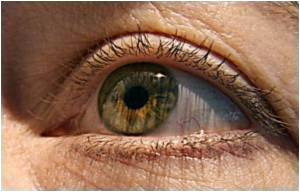A possible topical treatment for age-related macular degeneration (AMD) has been identified by Tufts University School of Medicine and the Sackler School of Graduate Biomedical Sciences scientists.

The team of researchers from Tufts, led by Rajendra Kumar-Singh, Ph.D., reported in their "proof of concept" study that topical application of pyridoxalphosphate-6-azophenyl-2',4'-disulfonic acid, a compound called PPADS, inhibits damage to the tissues in the eye that impacts the individual's ability to see color and fine detail, as well as reduces the growth of extraneous blood vessels in the back of the eye related to advanced AMD.
According to the National Eye Institute, more than 7 million people in the United States are at substantial risk of developing AMD. Factors that contribute to the development of AMD include age, diet, smoking, and genetic predisposition. Dry AMD is the more common and less serious stage of AMD, characterized by the slow loss or blurring of central vision in spots. Wet AMD, which almost always begins as dry AMD and only occurs in approximately 10% of AMD patients, is more advanced and characterized by the development of blood vessels in the back of the eye that often leak and damage the surrounding tissues. Only the wet form of AMD can be treated, with an ophthalmologist administering injections every four to 12 weeks that can be uncomfortable, risky, and burdensome to patients. The development of a topical eye-drop treatment that works in both dry and wet AMD could increase treatment adherence and reduce patient discomfort by reducing or removing the need for direct injections.
"An ideal therapy would be one that can be self-administered daily by patients. Further studies are needed to determine safety, dosage, and other factors before advancement of this therapy towards clinical trials, but our study suggests that there's significant promise for the development of self-administered topical treatments for age-related macular degeneration in humans," said senior author Rajendra Kumar-Singh, Ph. D., associate professor of ophthalmology at Tufts University School of Medicine and member of the cell, molecular and developmental biology, genetics, and neuroscience graduate programs the Sackler School of Graduate Biomedical Sciences at Tufts.
To test the effectiveness of a topical application of PPADS, the team of researchers induced the tissue damage and blood vessel growth characteristics of AMD in anesthetized mice. The topical treatment was then administered every 24 hours for three consecutive days. The researchers then examined the eye tissues one week later to assess for progression of the damage and blood vessel growth.
"Our study found that topical application of the PPADS compound works on two fronts. First, it stops the damage to eyes caused by pores formed in the membrane that leads to cell death within the eye by stopping an immune system process known as complement that is responsible for dry AMD. Second, it prevents the formation of the blood vessels that can leak and damage the eye, a process associated with wet AMD" explained first author Kerstin Birke Ph.D., a postdoctoral scholar in the Kumar-Singh lab at Tufts.
Advertisement









